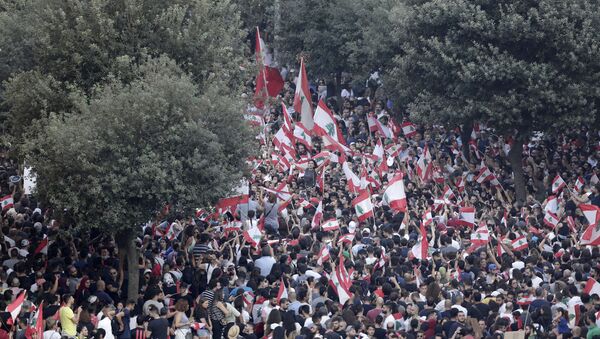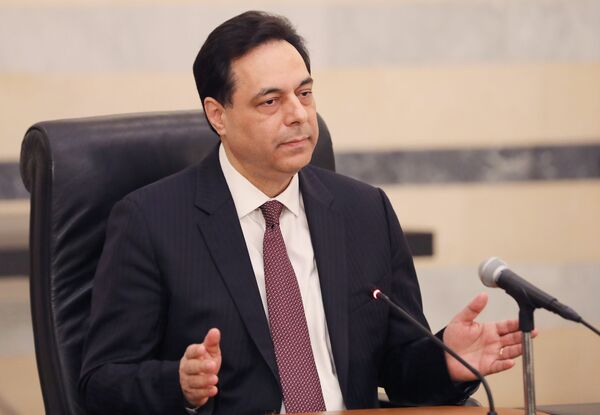Sputnik talked to experts regarding ways in which protesters' demands have changed, what steps the government has taken regarding those demands, and what Hezbollah's role in the unrest has traditionally been.
How it All Began
In September 2019, the Lebanese government declared a state of emergency for the national economy: the republic's foreign debt had exceeded 150 percent of GDP. In this regard, Saad Hariri's government opted for unpopular measures including cutting social spending and pensions for civil servants and the military. Authorities then raised taxes on tobacco and announced plans to increase the VAT from 11 percent to 15 percent by 2022.
The key trigger for the mass protests, however, has been a government decision to impose a tax on WhatsApp use. On 17 October, 2019, demonstrations began in Beirut, which have since given rise to other protests.
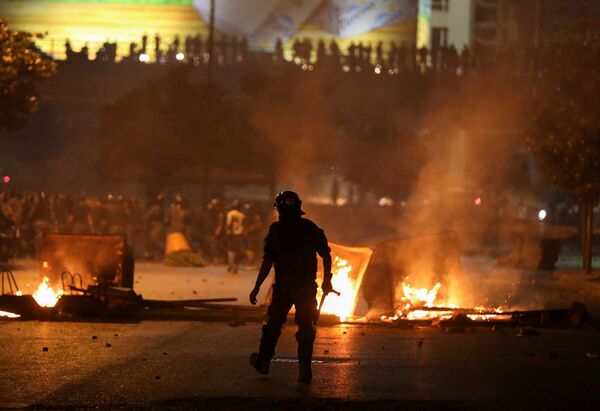
First Consequences
The first wave of demonstrations swept through every Lebanese city. The Cabinet immediately renounced introducing new taxes, announcing a 50 percent reduction in ministerial and parliamentarian salaries, which did little to fix the problem. Ongoing demonstrations resulted in the resignation of Saad Hariri's government on 29 October, 2019. According to Hariri, the government had nothing more that they could offer to the angry public.
On 19 December, 2019, President Michel Aung appointed a new Prime Minister, Hassan Diab, an independent politician. The move did nothing to reassure the public, whose demands were no longer just economic. People expressed no confidence in political elites, and accused them of corruption.
In that context, quickly forming a new government turned out to be difficult, if next to impossible. It was only on 22 January that Aung approved a new government make-up headed by Diab as prime minister. But the public stayed unhappy: after the new government make-up was announced, Beirut and other Lebanese cities faced a new wave of anti-government demonstrations, as many did not support Diab's candidacy.
Has Anything Changed?
Lebanese political scientist Nidal al-Sabaa considers the unstable Lebanese lira to be the primary reason for the months-long protests. The national currency has only plummeted since October 2019, however.
"The wave of demonstrations has only encouraged the Lebanese pound depreciation against the dollar. In late January and early February, after the government had been changed, it became clear that the lira continued declining. Then the protesters turned their anger on the government with renewed vigour, starting blocking key highways and state institutions in some areas".
"Given that during the protests, a number of companies and government agencies had to partially suspend their work, the authorities could do little to save the economy. During that period, things probably even went worse than they did in October" he said.
According to the expert, money, as well as Lebanese salaries, started to quickly depreciate.
"The worse the economic situation became, the more aggressive the protesters behaved. First blood was shed in clashes with the police: the wounded and killed appeared", al-Sabaa continued.
Lebanese streets calmed down only with the threat of the spread of the COVID-19 pandemic and the introduction of a "civil mobilisation" regime in the country. However, in April, demonstrations began again in Tripoli, Beirut and Side, quickly turning violent.
People partially calmed again after the Diab government announced an anti-crisis plan to stabilise the country's economy, but the plan has turned out to only be a lull before the next storm.
Protests Again, or Unexpected Demands
On 6 June, Beirut streets again faced a major demonstration after the quarantine ended. According to Lebanese political scientist Taufik Shuman, this demonstration is a turning point in the history of Lebanese protest.
"For the first time, quite unexpected demands to disarm Hezbollah and expand the powers of the UN international forces operating in southern Lebanon started to be heard at that demonstration. From that moment, the protesters split up: obviously, not everyone wanted that, initially, the street wanted something completely different. But many remained. And this makes us wonder", he said.
Nidal al-Sabaa agreed, noting that with each wave of protests, Lebanese demonstrators' demands expanded, going beyond dissatisfaction only with the country's economic policy.
"At each stage, demands are growing at a tremendous pace: first, the protesters moved from WhatsApp tax to lira's rate to the dollar, which has always been fixed at the state level. Then they started expressing dissatisfaction with banks, starting damaging them; then they started violating the state interests, blocking the roads".
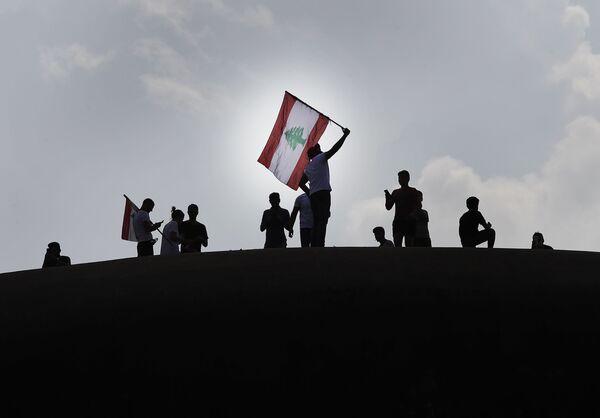
"The protesters' demands can only be compared with a machine that has lost control: it goes at high speed and we don’t know where, when, and, most importantly, how it will stop", he said.
The highest level of escalation was recorded in Tripoli. During protests on the night of 12 June, rioters burned a branch of the Central Bank of Lebanon and attacked security forces. Several dozen people from both sides were injured.
On 14 June, protesters blocked the way for food trucks heading for Syria. It turned out to be a convoy transporting humanitarian aid to the neighbouring country.
July Demonstrations – New Wave?
Active protests subsided for 10 days, but the issue of Hezbollah's responsibility for Lebanon's deepest crises has not been resolved.
On the night of 2 July, a new wave of demonstrations swept through Beirut streets. Mass protests in the Lebanese capital started on the afternoon of 1 July and continued throughout the night. The new wave of anger is caused by increased prices for bread and food, as well as for fuels and lubricants.
At night, due to the fuel oil crisis, large ares of Beirut and other cities were plunged into darkness. The state power supply has deteriorated, and several private power generator owners have taken advantage of the situation by raising prices for their services.
Samy Gemayel, leader of the opposition Kataeb Party, called on the demonstrators – "both Christians and Muslims" – to stand together for the resignation of the ruling cabinet. People appear to be much more willing to support that call than to engage in attempts to inflame interfaith tensions.
According to Shuman, an attempt to transform street sentiment from economic demands into purely the political has proved beneficial to a number of politicians, both in Lebanon and outside the country.
"It seems that such slogans for the street are external; perhaps, they are even external to the country. However, they were supported by some Lebanese parties seeking to transform popular anger from the fight against corruption into a confrontation with Hezbollah. As you know, the latter bothers so many of its opponents both domestically and abroad", he added.
Hezbollah's Positions
Amid recent street slogans, the question arises: where is Hezbollah and what position has it occupied all these months?
Initially, Hezbollah opposed the demonstrations. In October 2019, the movement leader, Hassan Nasrallah, said that he did not support the protests or the protesters' calls for the government's resignation. He suggested that the Cabinet did not have the time to resolve all the accumulated economic problems, but doubted whether new taxes would resolve economic problems.
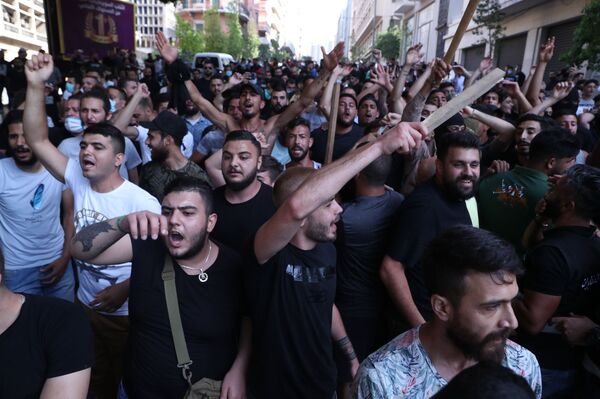
The Shiite movement's positions have not changed much with the Hariri government's resignation and the inauguration of the Diab cabinet: they still oppose the riots. The party also opposes the government’s ineffective economic policy.
According to Shuman, when Diab was appointed prime minister, the Hezbollah started taking a more active part in attempts to carry out reforms, than it had under the Hariri government.
"Hezbollah started taking a greater part in the process of political reform in Lebanon; the party openly declared its focus on fighting corruption. That was supposed to be a wonderful image in the eyes of the Lebanese street", he said.
Nidal al-Sabaa agreed, noting that movement members no longer remained aloof from the demonstrations, especially when the Lebanese currency began to plummet.
"Of course, both Hezbollah members and its supporters suffered from lira depreciation, just like all other Lebanese. I can say for sure that party employees' salaries, like everyone else's, have fallen by an average of 60 percent due to a sharp lira depreciation. Therefore, the movement members and its supporters were also seen at demonstrations in different cities. Officially, the movement also opposes inefficient economic measures", al-Sabaa said.
But the Shiite movement was caught in the middle of events in June as protesters began to blame Hezbollah for the Lebanese lira's 70 percent collapse, as well as for its activities in Syria.
Speaking of dissatisfaction with the actions of Hezbollah, al-Sabaa said that "the movement generally believes that the current currency problem is aimed against it. And now we see the opposition, demonstrators and those who shout out slogans at demonstrations saying that it is Hezbollah that is responsible for this; saying that Hassan Diab is influenced by the Shiite movement".
Hezbollah is also blamed for the fact that the American "Caesar's plan", introduced against Syria and its allies, will hit the already fragile Lebanese economy with sanctions.
"The society fears future sanctions associated with 'Caesar's plan'. In this context, it is totally incomprehensible how to deal with this. But the fact is that not only Lebanese but also Syrians went to our banks to buy dollars. And this is also very dangerous for the national economy. And here again, the blame is shifted on Hezbollah and its activities in Syria", Shuman said.
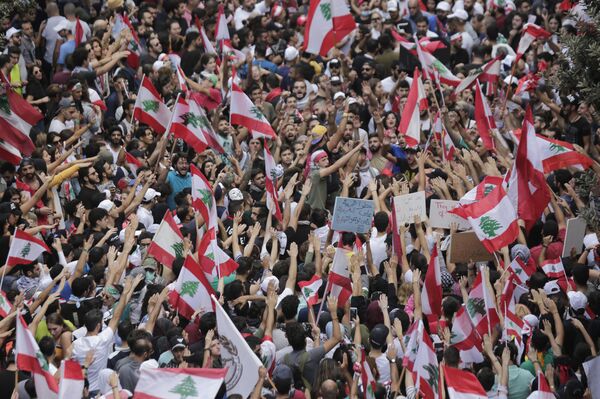
Foreign Reaction
From the beginning of the recent Lebanese protests, Aung and both prime ministers – particularly Diab in recent months – have blamed 'foreign forces' for attempts to escalate the situation on Lebanese streets.
Usually, Lebanese politicians call the US and Israel the main culprits. Accusations against the US intensified after the so-called Caesar's plan was adopted, which put Lebanon at risk.
Al-Sabaa sees a pre-established destabilizing effect in the American Caesar's plan, and the sanctions imposed on Lebanon.
"It was clear that any large-scale anti-Syrian sanctions would affect Lebanon. But when they are automatically directed against the Assad regime's allies, including Hezbollah, the only thing to do is wait for a strike. I'm afraid that with the introduction of sanctions, economic problems will become even greater, the streets will only become more violent and speak louder about Hezbollah's responsibility for the collapse", he said.
In turn, Schuman sees Israel’s interest in the Lebanese escalation, as a weak and disarmed Hezbollah would pose a much lower risk for Tel Aviv if there is a common border.
"Israel is more than ever benefiting from calls for disarming the Shiite movement and expanding the rights of the UN International Force in the south of the country. A weakened Hezbollah will only untie the hands of the Israeli side, which already allows itself to violate Lebanese airspace. Moreover, let me recall you that we are still at war", he explained.
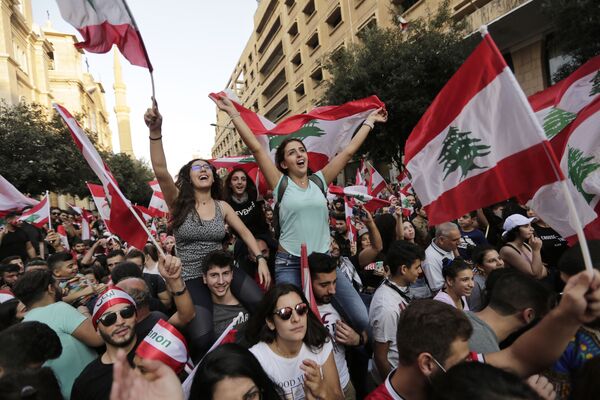
Syria has tried to distance itself from what is happening in Lebanon, as according to Syrian President Bashar al-Assad, Lebanese protests are "another state's internal affair, which is not worth interfering with".
"Such a position on the part of Syria is now the most advantageous and most obvious. Given that Caesar's plan has caused huge economic damage to the Syrians, it's not a good idea for them to comment on Lebanon’s affairs. Moreover, 'Caesar's plan' can trigger a wave of anti-Syrian sentiment among Lebanese protesters, which no one in Damascus needs either", al-Sabaa offered.
Begun in late October 2019, Lebanese protests have only continued. The current Lebanese government has promised to punish instigators, as well as to hold accountable any responsible.
Diab claimed that instigators and rioters may be located outside of Lebanon. He also asserted that political and economic demands could, if everyone cooperates, act to unite the representatives of the different faiths of Lebanon.

